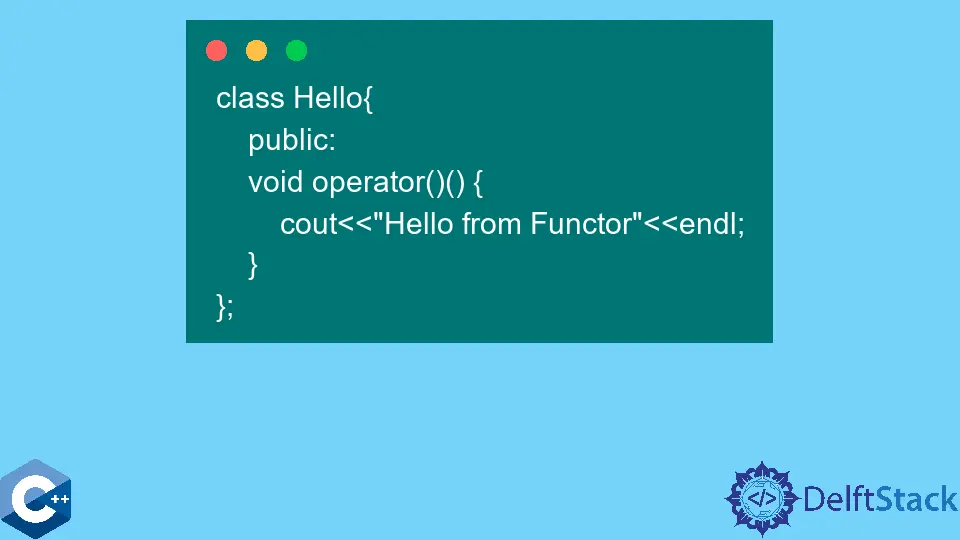Functors in C++

Functors, or function objects, are a powerful and versatile feature in C++. They allow you to encapsulate a function within an object, which can be particularly useful for passing behavior as arguments to algorithms or for maintaining state between calls.
In this article, we’ll explore what functors are, how they differ from regular functions, and how to implement them in your C++ code. Whether you are a beginner or have some experience with C++, understanding functors can significantly enhance your programming toolkit. So, let’s dive into the world of functors and see how they can simplify your coding tasks!
What is a Functor?
A functor is essentially an object that can be called as if it were a function. In C++, this is typically achieved by overloading the operator() within a class. This allows instances of the class to be used in a function-like manner. Functors can maintain state, which is one of the key advantages they have over regular functions. They can also be used with the Standard Template Library (STL) algorithms, making them extremely versatile.
Example of a Simple Functor
Let’s consider a simple example of a functor that adds a specific value to its input:
#include <iostream>
class Adder {
public:
Adder(int value) : value(value) {}
int operator()(int input) {
return input + value;
}
private:
int value;
};
int main() {
Adder addFive(5);
std::cout << addFive(10) << std::endl;
return 0;
}
In this example, we define a class Adder that takes an integer value in its constructor. The operator() is overloaded to add this value to any integer input. When we create an instance of Adder with the value 5 and call it with 10, it returns 15.
Output:
15
This demonstrates how functors can encapsulate behavior and maintain state, making them a powerful alternative to plain functions.
Advantages of Using Functors
Using functors in C++ comes with several advantages that can improve code readability and performance. First, they allow for stateful operations, which means you can store data within the functor itself. This is particularly useful in scenarios where you need to maintain context between function calls.
Additionally, functors can be more efficient than function pointers. Since they are objects, the compiler can optimize their usage better, leading to faster execution. Moreover, functors can be easily integrated with STL algorithms, enabling more complex operations with less boilerplate code.
Example of a Stateful Functor
Here’s a more complex example that illustrates the advantages of stateful functors:
#include <iostream>
#include <vector>
#include <algorithm>
class Multiplier {
public:
Multiplier(int factor) : factor(factor) {}
int operator()(int input) {
return input * factor;
}
private:
int factor;
};
int main() {
std::vector<int> numbers = {1, 2, 3, 4, 5};
Multiplier multiplyByTwo(2);
std::transform(numbers.begin(), numbers.end(), numbers.begin(), multiplyByTwo);
for (int num : numbers) {
std::cout << num << " ";
}
return 0;
}
In this example, the Multiplier functor multiplies its input by a specified factor. We use std::transform to apply this functor to each element in a vector of integers. The result is that each number in the vector is multiplied by 2.
Output:
2 4 6 8 10
This showcases how functors can be seamlessly integrated with STL algorithms to perform operations on collections of data.
Functors vs. Lambda Expressions
While functors are a powerful feature in C++, the introduction of lambda expressions in C++11 has provided another way to achieve similar functionality. Lambda expressions are essentially unnamed function objects, allowing for concise and readable code. However, functors still have their place, especially when you need to maintain state or reuse the same behavior across different parts of your code.
Example of a Lambda Expression
Here’s a quick comparison of a functor and a lambda expression that perform the same task:
#include <iostream>
#include <vector>
#include <algorithm>
int main() {
std::vector<int> numbers = {1, 2, 3, 4, 5};
auto multiplyByThree = [](int input) { return input * 3; };
std::transform(numbers.begin(), numbers.end(), numbers.begin(), multiplyByThree);
for (int num : numbers) {
std::cout << num << " ";
}
return 0;
}
In this example, we define a lambda expression that multiplies its input by 3. We use std::transform in the same way as before.
Output:
3 6 9 12 15
While both approaches achieve the same result, lambdas can often lead to more concise code, especially for simple operations. However, for more complex behaviors or when state needs to be maintained, functors may still be the better choice.
Conclusion
Functors in C++ provide a flexible and powerful way to encapsulate behavior and maintain state. They can enhance code readability and performance, particularly when used with STL algorithms. While lambda expressions offer a more modern and concise alternative, functors remain relevant for complex scenarios. By incorporating functors into your C++ toolkit, you can write cleaner, more efficient code that is easier to maintain.
FAQ
-
What is a functor in C++?
A functor is an object that can be called as if it were a function, typically achieved by overloading theoperator()in a class. -
How do functors differ from regular functions?
Functors can maintain state between calls, while regular functions cannot. Functors are also objects, allowing for more flexible usage. -
When should I use functors instead of lambda expressions?
Use functors when you need to maintain state or when the behavior is complex and could benefit from being encapsulated in a class. -
Can functors be used with STL algorithms?
Yes, functors can be seamlessly integrated with STL algorithms, allowing for powerful data manipulations. -
Are functors more efficient than function pointers?
Yes, functors can be more efficient than function pointers because the compiler can optimize them better as they are objects.
Husnain is a professional Software Engineer and a researcher who loves to learn, build, write, and teach. Having worked various jobs in the IT industry, he especially enjoys finding ways to express complex ideas in simple ways through his content. In his free time, Husnain unwinds by thinking about tech fiction to solve problems around him.
LinkedIn